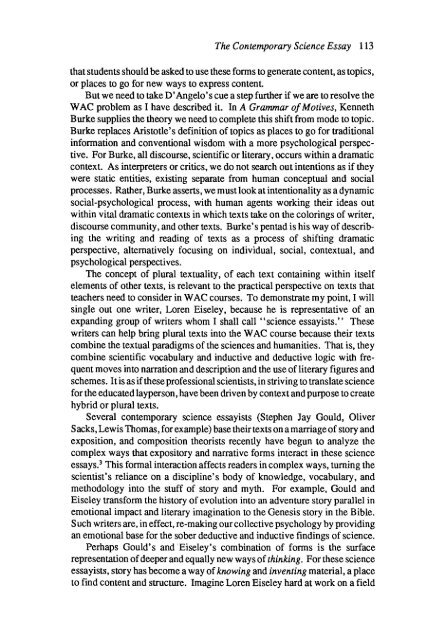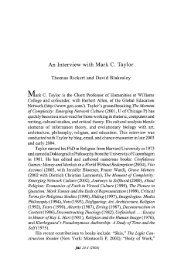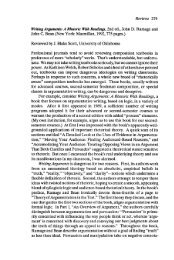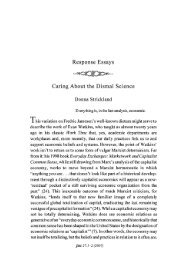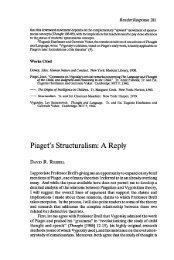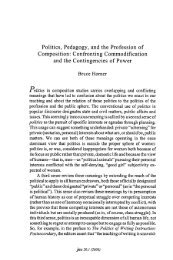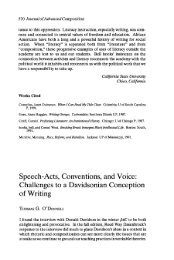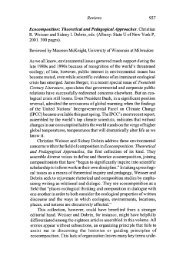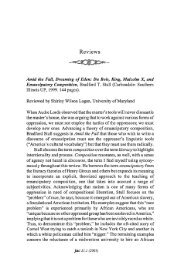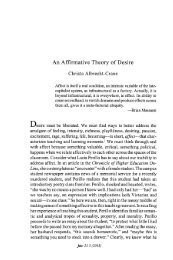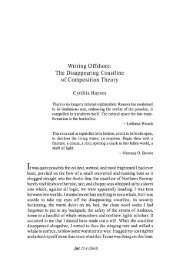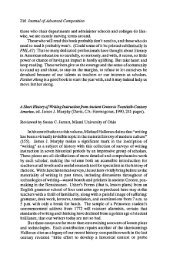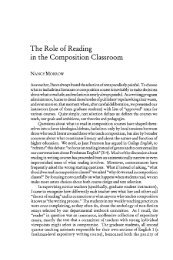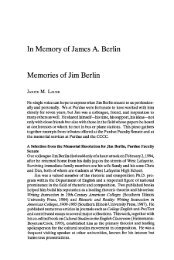Narrative Topic and the Contemporary Science Essay ... - JAC Online
Narrative Topic and the Contemporary Science Essay ... - JAC Online
Narrative Topic and the Contemporary Science Essay ... - JAC Online
You also want an ePaper? Increase the reach of your titles
YUMPU automatically turns print PDFs into web optimized ePapers that Google loves.
The <strong>Contemporary</strong> <strong>Science</strong> <strong>Essay</strong> 113<br />
that students should be asked to use <strong>the</strong>se forms to generate content, as topics,<br />
or places to go for new ways to express content.<br />
But we need to take D' Angelo's cue a step fur<strong>the</strong>r if we are to resolve <strong>the</strong><br />
WAC problem as I have described it. In A Grammar of Motives, Kenneth<br />
Burke supplies <strong>the</strong> <strong>the</strong>ory we need to complete this shift from mode to topic.<br />
Burke replaces Aristotle's definition of topics as places to go for traditional<br />
information <strong>and</strong> conventional wisdom with a more psychological perspective.<br />
For Burke, all discourse, scientific or literary, occurs within a dramatic<br />
context. As interpreters or critics, we do not search out intentions as if <strong>the</strong>y<br />
were static entities, existing separate from human conceptual <strong>and</strong> social<br />
processes. Ra<strong>the</strong>r, Burke asserts, we must look at intentionality as a dynamic<br />
social-psychological process, with human agents working <strong>the</strong>ir ideas out<br />
within vital dramatic contexts in which texts take on <strong>the</strong> colorings of writer,<br />
discourse community, <strong>and</strong> o<strong>the</strong>r texts. Burke's pentad is his way of describing<br />
<strong>the</strong> writing <strong>and</strong> reading of texts as a process of shifting dramatic<br />
perspective, alternatively focusing on individual, social, contextual, <strong>and</strong><br />
psychological perspectives.<br />
The concept of plural textuality, of each text containing within itself<br />
elements of o<strong>the</strong>r texts, is relevant to <strong>the</strong> practical perspective on texts that<br />
teachers need to consider in WAC courses. To demonstrate my point, I will<br />
single out one writer, Loren Eiseley, because he is representative of an<br />
exp<strong>and</strong>ing group of writers whom I shall call •• science essayists." These<br />
writers can help bring plural texts into <strong>the</strong> WAC course because <strong>the</strong>ir texts<br />
combine <strong>the</strong> textual paradigms of <strong>the</strong> sciences <strong>and</strong> humanities. That is, <strong>the</strong>y<br />
combine scientific vocabulary <strong>and</strong> inductive <strong>and</strong> deductive logic with frequent<br />
moves into narration <strong>and</strong> description <strong>and</strong> <strong>the</strong> use of literary figures <strong>and</strong><br />
schemes. It is as if <strong>the</strong>se professional scientists, in striving to translate science<br />
for <strong>the</strong> educated layperson, have been driven by context <strong>and</strong> purpose to create<br />
hybrid or plural texts.<br />
Several contemporary science essayists (Stephen Jay Gould, Oliver<br />
Sacks, Lewis Thomas, for example) base <strong>the</strong>ir texts on a marriage of story <strong>and</strong><br />
exposition, <strong>and</strong> composition <strong>the</strong>orists recently have begun to analyze <strong>the</strong><br />
complex ways that expository <strong>and</strong> narrative forms interact in <strong>the</strong>se science<br />
essays.3 This formal interaction affects readers in complex ways, turning <strong>the</strong><br />
scientist's reliance on a discipline's body of knowledge, vocabulary, <strong>and</strong><br />
methodology into <strong>the</strong> stuff of story <strong>and</strong> myth. For example, Gould <strong>and</strong><br />
Eiseley transform <strong>the</strong> history of evolution into an adventure story parallel in<br />
emotional impact <strong>and</strong> literary imagination to <strong>the</strong> Genesis story in <strong>the</strong> Bible.<br />
Such writers are, in effect, re-making our collective psychology by providing<br />
an emotional base for <strong>the</strong> sober deductive <strong>and</strong> inductive findings of science.<br />
Perhaps Gould's <strong>and</strong> 'Eiseley's combination of forms is <strong>the</strong> surface<br />
representation of deeper <strong>and</strong> equally new ways of thinking. For <strong>the</strong>se science<br />
essayists, story has become a way of knowing <strong>and</strong> inventing material, a place<br />
to find content <strong>and</strong> structure. Imagine Loren Eiseley hard at work on a field


